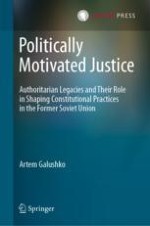2021 | OriginalPaper | Buchkapitel
2. Origins of Communist Politically Motivated Criminal Justice
verfasst von : Artem Galushko
Erschienen in: Politically Motivated Justice
Verlag: T.M.C. Asser Press
Aktivieren Sie unsere intelligente Suche, um passende Fachinhalte oder Patente zu finden.
Wählen Sie Textabschnitte aus um mit Künstlicher Intelligenz passenden Patente zu finden. powered by
Markieren Sie Textabschnitte, um KI-gestützt weitere passende Inhalte zu finden. powered by
